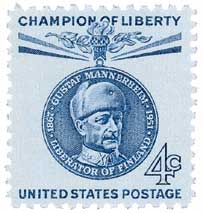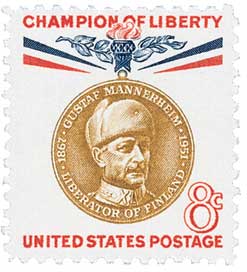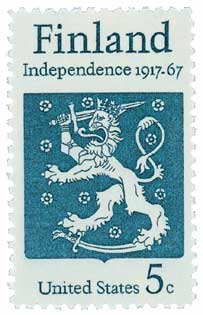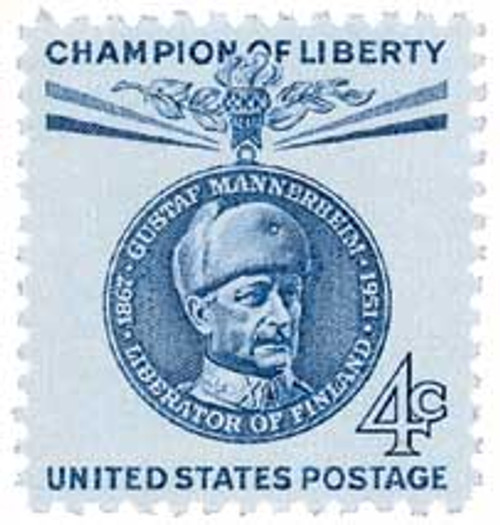
# 1165-66 - 1960 4c,8c Mannerhm FDC
Â
4¢ Gustaf Mannerheim
Champions of Liberty Series
Birth of Gustaf Mannerheim

Baron Carl Gustaf Emil Mannerheim was born on June 4, 1867, in Askainen, Grand Duchy of Finland, Russian Empire. A soldier, statesman, Marshal and President of Finland, Mannerheim led his countrymen though multiple wars, and is sometimes called the father of modern Finland.
Mannerheim was born into a family of Swedish noblemen that had first relocated to Finland in the late 1700s. He attended the Hamina Cadet School and Nicholas Cavalry School, joining the Chevalier Guard Regiment in 1891. Five years later he participated in the coronation of Emperor Nicholas II, an event that he considered to be one of the high points of his life. Mannerheim was a talented rider and was responsible for buying the army’s horses. In 1903, he took command of the model squadron and helped train equestrian cavalry regiments.

Mannerheim volunteered for the Imperial Russian Army during the Russo-Japanese War and was noted for his bravery at the Battle of Mukden. He earned special recognition from Tsar Nicholas II, who sent him on a secret intelligence mission to China. Mannerheim spent two years traveling there and collecting information on Chinese modernization, education, military, industry, and more.

During World War I, Mannerheim commanded the cavalry and served with distinction against Austro-Hungarian forces.  In 1917, he took leave and returned to Finland, where he witnessed the start of the February Revolution. After Tsar Nicholas abdicated, the new government felt Mannerheim didn’t support them, and he was relieved of his post.
Mannerheim was soon made commander of the White Guards in the Finnish Civil War. He led a force of 24,000 largely untrained troops that didn’t have enough guns to go around, against a combined force of about 100,000 Communist Finish Red Guards and Russian troops. At Vaasa, he surrounded a Russian garrison with only his front troops armed, leading the Russians to surrender and capturing much-needed guns troops for his troops.

In 1918, Mannerheim was sent to Britain and France to secure recognition of Finland’s independence. Upon returning to Finland, he was elected regent and oversaw the creation of a new republican constitution. He placed second in the country’s first presidential election and stepped away from politics for nearly a decade. In the meantime, he worked with the Red Cross and founded the Mannerheim League for Child Welfare.

In 1931, Mannerheim was made chairman of Finland’s Defense Council, and was promised that if the country went to war, he would be made commander-in-chief of the Army. After the Soviets attacked in 1939, he took command of the Finnish Army at the age of 72. He led the forces through the Winter War, Continuation War, and Lapland War, which were part of World War II. While Finland initially allied with Germany in their fight against the Soviets, by 1944 they joined the Allies and fought against Germany. In August 1944, Mannerheim was made president of Finland. He’s largely been commended for his leadership during this difficult time. Finland faced severe armistice terms overseen by a Soviet-led Allied Control Commission.

Mannerheim suffered from poor health and resigned in 1946, citing that he had met his obligations of leading Finland through the end of the war and carrying out their armistice obligations. He spent most of his final years at a sanatorium in Switzerland, working on his memoirs. He died there on February 4, 1951. Mannerheim is generally considered to be Finland’s greatest statesman. Even though his country was allied with Germany during part of World War II, many Allied leaders, including Winston Churchill, held him in high regard. In 1942, Mannerheim received the unique title of marshal of Finland at his 75th birthday celebration. At that time, his birthday was also declared as Flag Day, which is still celebrated today. A 2004 Finnish survey voted Mannerheim the greatest Finn of all time.
Â
4¢ Gustaf Mannerheim
Champions of Liberty Series
Birth of Gustaf Mannerheim

Baron Carl Gustaf Emil Mannerheim was born on June 4, 1867, in Askainen, Grand Duchy of Finland, Russian Empire. A soldier, statesman, Marshal and President of Finland, Mannerheim led his countrymen though multiple wars, and is sometimes called the father of modern Finland.
Mannerheim was born into a family of Swedish noblemen that had first relocated to Finland in the late 1700s. He attended the Hamina Cadet School and Nicholas Cavalry School, joining the Chevalier Guard Regiment in 1891. Five years later he participated in the coronation of Emperor Nicholas II, an event that he considered to be one of the high points of his life. Mannerheim was a talented rider and was responsible for buying the army’s horses. In 1903, he took command of the model squadron and helped train equestrian cavalry regiments.

Mannerheim volunteered for the Imperial Russian Army during the Russo-Japanese War and was noted for his bravery at the Battle of Mukden. He earned special recognition from Tsar Nicholas II, who sent him on a secret intelligence mission to China. Mannerheim spent two years traveling there and collecting information on Chinese modernization, education, military, industry, and more.

During World War I, Mannerheim commanded the cavalry and served with distinction against Austro-Hungarian forces.  In 1917, he took leave and returned to Finland, where he witnessed the start of the February Revolution. After Tsar Nicholas abdicated, the new government felt Mannerheim didn’t support them, and he was relieved of his post.
Mannerheim was soon made commander of the White Guards in the Finnish Civil War. He led a force of 24,000 largely untrained troops that didn’t have enough guns to go around, against a combined force of about 100,000 Communist Finish Red Guards and Russian troops. At Vaasa, he surrounded a Russian garrison with only his front troops armed, leading the Russians to surrender and capturing much-needed guns troops for his troops.

In 1918, Mannerheim was sent to Britain and France to secure recognition of Finland’s independence. Upon returning to Finland, he was elected regent and oversaw the creation of a new republican constitution. He placed second in the country’s first presidential election and stepped away from politics for nearly a decade. In the meantime, he worked with the Red Cross and founded the Mannerheim League for Child Welfare.

In 1931, Mannerheim was made chairman of Finland’s Defense Council, and was promised that if the country went to war, he would be made commander-in-chief of the Army. After the Soviets attacked in 1939, he took command of the Finnish Army at the age of 72. He led the forces through the Winter War, Continuation War, and Lapland War, which were part of World War II. While Finland initially allied with Germany in their fight against the Soviets, by 1944 they joined the Allies and fought against Germany. In August 1944, Mannerheim was made president of Finland. He’s largely been commended for his leadership during this difficult time. Finland faced severe armistice terms overseen by a Soviet-led Allied Control Commission.

Mannerheim suffered from poor health and resigned in 1946, citing that he had met his obligations of leading Finland through the end of the war and carrying out their armistice obligations. He spent most of his final years at a sanatorium in Switzerland, working on his memoirs. He died there on February 4, 1951. Mannerheim is generally considered to be Finland’s greatest statesman. Even though his country was allied with Germany during part of World War II, many Allied leaders, including Winston Churchill, held him in high regard. In 1942, Mannerheim received the unique title of marshal of Finland at his 75th birthday celebration. At that time, his birthday was also declared as Flag Day, which is still celebrated today. A 2004 Finnish survey voted Mannerheim the greatest Finn of all time.












